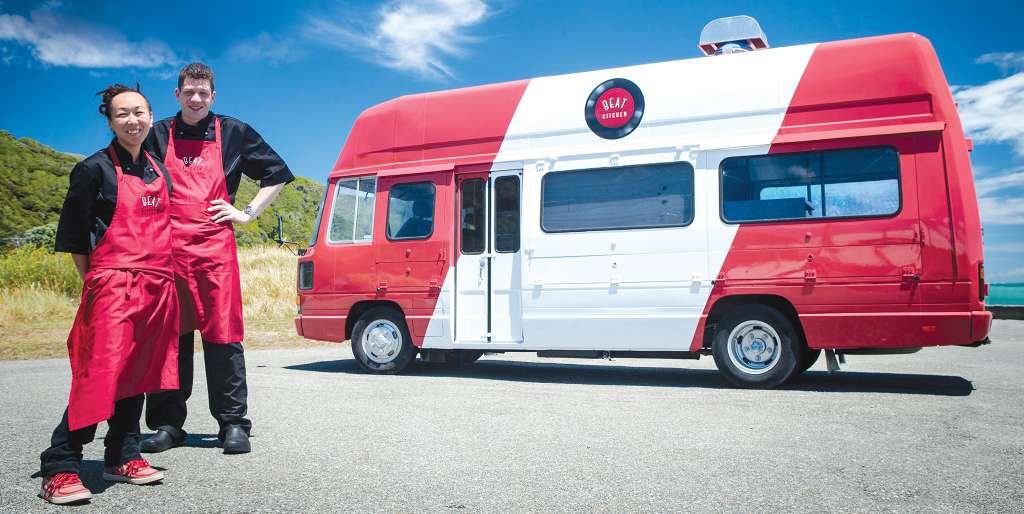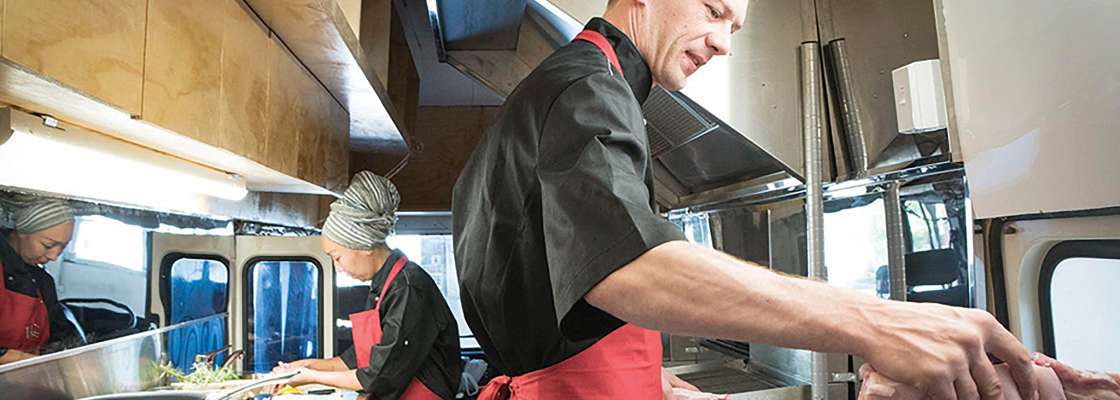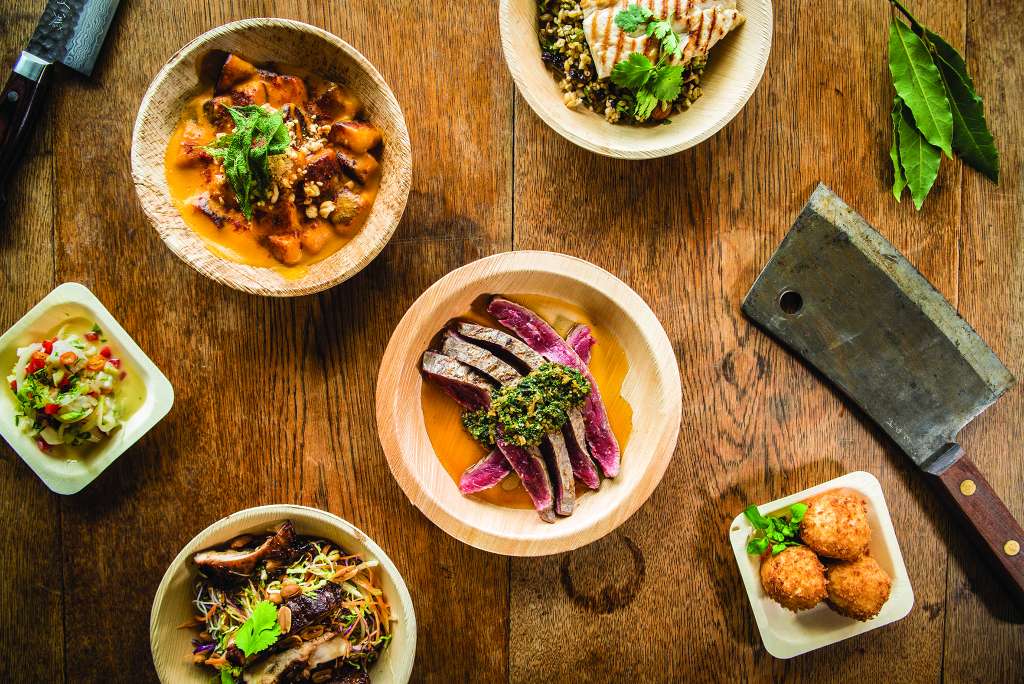An inside look into the food truck business with Wellington’s Beat Kitchen
If you live in an urban area, it’s likely you’ve seen a few food trucks around serving up everything from burgers and fries all the way up to elaborate escargots canapés. Whether it’s a tempting alternative for restaurateurs looking for a change of pace or a unique business concept for new entrepreneurs, food trucks are changing the way New Zealanders are thinking about eating and dining.
We caught up with Craig Sefton, co-owner/operator of member food truck Beat Kitchen, one of Wellington’s best known food trucks, and picked his brain on the art of “food trucking”.
Can you introduce yourself and tell us a little about the owners of Beat Kitchen?
Craig: Kei (the other half of Beat Kitchen) and I worked in a café in Christchurch for a while and we always talked about opening a restaurant together one day. I never really thought it would happen and it came out of the blue one day. All of a sudden we owned a bus and we turned it into a food truck.

Why a truck? Why not bricks and mortar?
Craig: I have always wanted a restaurant for a while, ever since I got better at cooking, but we didn’t want to be responsible for big investors and do monthly reports…we wanted a bit more control and freedom.
So the way to do it was as a food truck.
It’s definitely a lot different to the restaurant world than I thought it was going to be.
Can you give a brief rundown of what goes into starting up a food truck and getting squared with the city on regulations?
Craig: It was a lot of work for us. The main difference with us is that our truck is being registered as a commercial kitchen so we don’t have an off-site kitchen that we go to do all the prep.
Putting in a commercial grade kitchen in the back of a bus was one of the harder things. Getting all the right things in the right places, and then getting the Council to sign-off on it was hard work because there were no regulations for me to go by. It hadn’t been done before.
That was the biggest problem – getting it to be a legitimate, legal commercial kitchen on wheels.
It’s definitely a lot different to the restaurant world than I thought it was going to be.
The Council basically said I had to write the book on a commercial kitchen in a food truck because I was going in and asking questions like “I’ve got a deep fryer that’s this big with four gas hobs, and a grill…so how many cubic metres of air does my extraction system need to be?”
This has pretty much become a standard, so if someone else wants to put in a commercial kitchen into a truck, it’s got to be at least this.
How long did that take from decision to consent?
Craig: I bought the bus in February up in Auckland and I brought it back to Wellington in March, and then we traded on New Year’s Eve. So the whole process from buying it, designing it, figuring out the business plan, getting it all up and running, and building custom-everything took about 10 months.
What are some challenges specific to “food trucking” that wouldn’t necessarily be similar to a regular brick and mortar?
Craig: Consistency is a big one.
There’s no consistency in the food truck world. In a restaurant, Monday, Tuesday, Wednesday would be quieter and you can prep, catch up, and prepare for the busy end of the week. There’s none of that.
In the food truck world, you can get up in the morning with a fridge full of food ready to go, and it’s raining sideways from out of nowhere. You’re now stuck in the garage – there’s no point in going out. We tried going out in the rain and there’s no point. People don’t come, which is fair enough.
The funniest one that gets me every time is when we’re chopping a bunch of herbs and a gust of wind comes through the hatch and then your herbs are all over the truck. You just don’t get that in a restaurant. That makes me laugh every time – food truck problems.
A link into the Council of some sort may be quite helpful to finding places to trade – that’s been one of my biggest headaches. We have constraints due to the size of our truck and what we do.
I think the Council is a bit short on the regulations for food trucks. Now that there’s so many of us, they don’t really know what to do. When we first started, I had a hell of a time finding the right person to contact at the Council about places to trade. I had 9 locations scouted and asked if I could park my truck, and the answer was just no, with no explanations.
Finding places to trade, especially over winter, where there’s a roof so it doesn’t matter if it’s raining – that’s the hardest part.
Your famous brioche donuts seem to be in hot demand. What’s the secret in making them so awesome and how did they get so popular?
Craig: I’m not sure how they got so popular. The first gig we did on New Year’s made them. I thought, “what are we going to do in this thing?” We didn’t have any money left from the budget and we didn’t have much to buy food with for the first gig so I thought we could make things that are cheap and sell them. And dough doesn’t cost much so we made donuts and it took off. We sold the whole lot. We kept doing it; people loved it.
You have a pretty great selection of street eats on your menu, including your World Famous in Wellington 15-hour pulled pork burger. How often do you change your menu?
Craig: We change the menu every day. Maybe not the whole menu, but definitely lots of different parts of it. It’s not just taking components and moving them around, we also change whole dishes.
We heavily rely on our Vac-packer – everything we do, we Vac-pack again. It’s all about making the right thing the first time and then you can make it into something else, and then something else, and then hopefully you’ve got rid of it by then.
We basically have no wastage at all or it’s very rare for us to take food home.
Do you have long-term or bigger picture goals for the truck?
Craig: Because it’s quite unique to change the menu every day and doing things other people don’t really do, we were at a bit of a loss for a while meaning how do you grow it? What do you do? There’s no aspirations to have a fleet of them or franchise it.
I think we’re probably going to end up getting a brick and mortar eventually. That’ll make this truck become super viable because it’ll come out of the garage when there’s a big wedding or festival or if someone wants a big private party. It’ll take a lot of the risk out of sitting on the side of the waterfront and not knowing what’s going to happen.
All photos via Beat Kitchen
In case you missed it, check out our March Member Spotlight on The Mussel Inn: Longevity in Hospitality
And don’t forget to read about our April Member Spotlight on O.G.B.: Rebuilding and bringing back heritage to Christchurch

